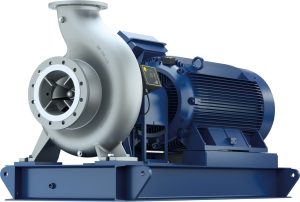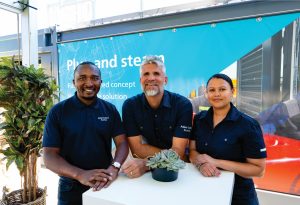Martin Engineering, a leading name in bulk handling solutions, is marking 80 years of product innovation, engineering expertise and global growth.
During a month of celebrations in September 2024, the firm invited customers, local communities, and employees’ families to its flagship Centre for Innovation in Neponset, Illinois and see for themselves the extent of Martin’s investment in engineering research and technological advancement over eight decades.
Martin Engineering has become synonymous with the development and manufacture of innovations that deliver cleaner, safer and more productive bulk materials processing. The company holds dozens of patents for engineering designs that have revolutionised workplace safety and production efficiency in foundation sectors like mining and quarrying, cement and steel production, as well as resource recovery and recycling.
Primarily focused on conveyor belt performance and bulk flow technologies, Martin products are proven to eliminate blockages, prevent spillages and reduce dust emissions – a commitment that’s reflected in the company slogan “Problem Solved – Guaranteed”.
Visitors to the Centre for Innovation were impressed by what they saw according to Martin Engineering marketing manager, Seth Mercer: “People commented that the research facility was much bigger than it looked from the outside and more impressive than they anticipated, and they were amazed by the scale of the operation and breadth of our product range. Even those who were familiar with Martin were both surprised and impressed with how much the company has grown in recent years.”
The Martin Engineering story began in the midst of World War II when Edwin F. Peterson, the son of Swedish immigrants, followed in his father’s footsteps and took a job as a pattern maker at Demmler Manufacturing, a steel foundry and fabrication business in Illinois, United States.
Edwin witnessed his co-workers using sledgehammers to beat on core machines, loosen the sand and release steel components from their moulds. Troubled by the health and safety risks, equipment damage and loss of productivity, he was convinced there must be a better way and began working on a solution.
This led to the development of the Vibrolator – a compact ball vibrator that used compressed air to propel a ball bearing inside two steel raceways. The resulting vibration was enough to dislodge the sand and empty the core machines without the need for manual beating.
It soon became clear that the device could be used for numerous other manufacturing operations handling loose materials. Edwin started the business in September 1944 with the backing of investor Charles H. Waller and friend Jim Martin – who gave his name to the business as Edwin felt ‘Martin’ had better name recognition than ‘Peterson’.
The Vibrolator soon went into production and was patented in 1949. Still available and in use 80 years later, the Vibrolator was the first in a long line of product innovations introduced by Martin to solve problems in bulk materials handling.
Edwin’s son, Edwin “Ed” H. Peterson, started working for the business while still in high school. Ed worked with his father on numerous innovations and new products through the 1950s and 1960s, gradually assuming the leadership role in the company as it developed its international business.
By the 1970s, Ed had firmly placed his personal stamp on the company, implementing bold plans for worldwide growth to accelerate Edwin’s legacy of developing innovative products to solve problems in bulk materials handling. Martin continued to expand both organically and through acquisition, taking the business into new corners of the globe.
Meanwhile, the development of high-performance components for conveyors catapulted Martin Engineering into a new market-leading position with a comprehensive line of belt cleaners, dust-control products, transfer-point solutions and other patented innovations to improve safety, efficiency and productivity.
With patents and established distributors and licensees for their products in a rapidly expanding network of countries, Martin Engineering turned its attention to the knowledge and skills of workers responsible for operating and maintaining processing plants to help them improve safety and productivity.
That gave rise to major investment in education and training for Martin customers – a defining moment which led to the development of the firm’s internationally recognised Foundations series of reference books and training programmes. First published in 1991, more than 22 000 print copies of the books are now in circulation around the world.
Today, Martin Engineering employs more than 1 000 people worldwide in offices and factory facilities across six continents. The business has a network of partners and distributors that gives Martin an enviable global footprint, most recently across Africa, the Middle East and South East Asia. Yet, despite its global presence, Martin remains family-owned – Ed H. Peterson is still Chairman, and the company’s culture is one of strong family values and a spirit of ‘better together’.
Martin Engineering’s extensive product portfolio includes the pioneering CleanScrape conveyor belt cleaning system – one of the most durable, flexible and versatile belt cleaner on the market – as well as next-generation Air Cannons with SMART Series Nozzles that improve safety and maintenance efficiency. And among the latest innovations is the game-changing N2 remote monitoring system that reduces physical inspections, saves time and effort, lessens safety risks and helps control costs.
Martin Engineering CEO Robert Nogaj says: “80 years of innovation and growth is an important milestone for Martin Engineering. Our enduring success is a testament to the founding legacy of Edwin F. Peterson and the vision and ambition of Ed H. Peterson to drive that legacy forward. Above all, our longevity is a reflection of the good people we have working for Martin the world over, whose expertise and commitment is unmatched.”
“We have always been proud of our ability to deliver quality solutions that address specific bulk handling problems, and investing heavily in research and development has always been a key component of that. We are continually working on ways to solve our customers’ problems, and we are excited about the next generation of solutions we’ll bring to market.”
“Further, our hands-on approach to improving knowledge and skills among our customers’ workforce through on-site, web based, and online training courses has helped us to build loyalty. It is rewarding to know we are helping to improve knowhow and expertise as well as safety and productivity for producers of essential materials.”





